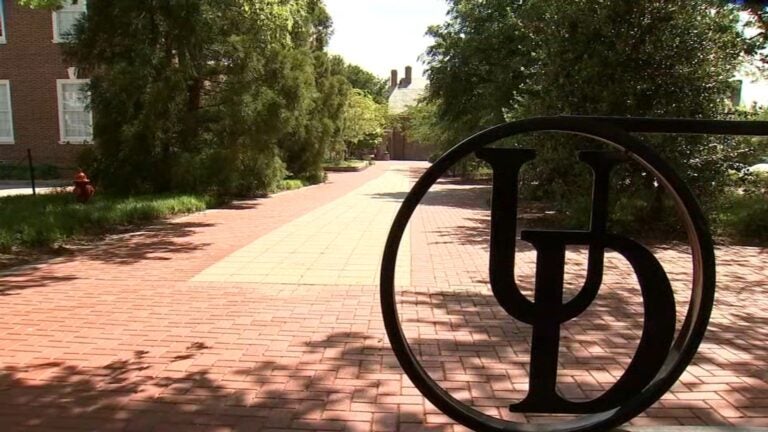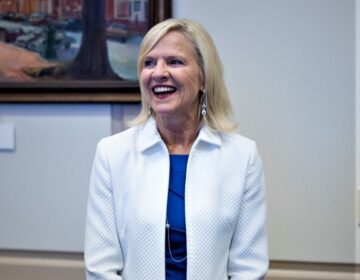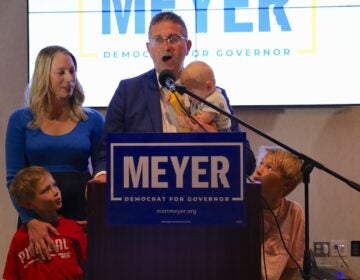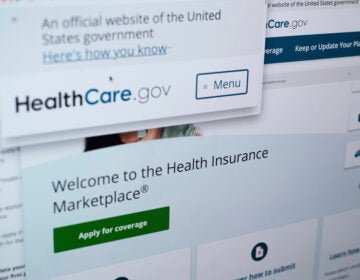University of Delaware disputes law barring state officials from earning taxpayer money from two jobs at once
The school argues its charter means it is not subject to some state laws and efforts to force it to be transparent.
Listen 1:04
A sign at the University of Delaware (6abc)
From Philly and the Pa. suburbs to South Jersey and Delaware, what would you like WHYY News to cover? Let us know!
This story was supported by a statehouse coverage grant from the Corporation for Public Broadcasting.
A newly released audit from Delaware Auditor Lydia York shows that at least six current and former state lawmakers were potentially double-dipping. That is they earned taxpayer money working two taxpayer-funded jobs at state or local government entities at the same time between FY 2020 through 2022. It’s the first report issued on compliance with the law since 2017.
But some of the employers and lawmakers are pushing back, including the University of Delaware, which said it does not have to comply with the 1986 state law that requires employers using taxpayer dollars for payroll to ensure officials are not paid for two jobs at one time. The school did not respond to questions about what other state laws it’s exempt from following and why taxpayers should not have insight into how the school spends their money.
The investigators reviewed 22 state employees, including former legislators, court employees and three people who have held top jobs in Gov. John Carney’s administration, such as Lt. Gov. Bethany Hall-Long. Fifteen of the 22 worked for UD.
The report published Tuesday again raised the issue of whether UD is a quasi-private entity or a government agency subject to oversight and required to be transparent about how it spends taxpayer money. State lawmakers gave the school $143 million from the general fund for the 2024–25 fiscal year.
York said this is the most complete audit ever done on compliance to this law.
“The report as it’s issued, is also the most comprehensive report on this topic that this office has ever issued,” she said. “We hope that what we’ll find in [the] future is that employers will have the proper procedures and policies in place so that we can determine definitively that folks are not being paid for coincident time.”
Six state workers had findings showing they possibly worked the same hours for both jobs, of those three were current lawmakers and three were former ones.
Lt. Gov. Bethany Hall-Long worked a second job at UD, as did House Majority Leader Melissa Minor-Brown. Minor-Brown also worked at Delaware Technical Community College. Rep. Sherae’a Moore was a teacher at Eastside Charter School.
Former state Sen. Ernie Lopez worked for UD while a state lawmaker, former state Rep. Larry Mitchell worked for DelTech and state Rep. Andria Bennett was hired as the City of Dover clerk in December 2021.
The report found that many of the employers, including the General Assembly, lacked complete records on dually employed staff and had payroll and employee policies that didn’t comply with law.
The University of Delaware told investigators with the auditor’s office that Hall-Long’s responsibilities were adjusted throughout the year to accommodate her elected official responsibilities, but provided no documentation to support that claim. Hall-Long also unsuccessfully ran for governor this year, losing in the primary to New Castle County Executive Matt Meyer.
Lopez’s UD salary was reduced by 10% because of his duties as a state senator. Hall-Long declined to comment for this story. Lopez and Mitchell did not respond to a request for comment.
York said UD only provided summaries of information they requested and when the audit was slated to begin in 2022, the college originally declined to provide any information. Despite its limited cooperation, the university submitted a letter to the Auditor of Accounts’ office earlier this month that said the school was not bound by this law or efforts of transparency in how it uses taxpayer funds. It disputed the findings as “improper and misplaced” and “inappropriate.”
“The findings make no mention of state appropriated funds and even if they did, the reach of …. the university charter would limit the scope of any audit to the mere notation that there were university employees paid with state funds,” said UD Deputy General Counsel Daniela Ivancikova. “The limited authority given to the auditor under this provision does not include the power to investigate the compliance with laws that do not apply to the university.”
York said UD not participating in the audit was not an option.
“Typically what would happen is UD would say, ‘This doesn’t apply to us, go away,’ and the auditor’s office would go away,” she said. “That wasn’t going to be an acceptable outcome this time around.”
Bennett said she did nothing wrong and the City of Dover has backed her up. The Human Resources director mistakenly gave investigators incorrect information and was unaware the city council brought her in at a reduced salary because of her dual employee status, Bennett said. She also said she kept copious time keeping records. But she said by the time she was contacted by the auditor’s office, the report was final, showing 33 times Bennett was at legislative hall during her work hours with the city. She left office at the end of 2022.
“I’m really upset because now they’re saying that the city of Dover put together a cushy job for me,” she said. “I have the minute I got to work in the morning at the city of Dover. I have notes that say ‘went to Leg Hall for session’ and then I would come back at night for council meetings.”
Council President David Anderson said in a statement that the city felt they were in compliance because of the reduced salary and Bennett tracking her time.
House and Senate staff said in response to the audit’s findings that the legislature doesn’t keep complete data on dually employed members that those employees are responsible for keeping track of their hours and the chambers keep track of attendance in session and for committees, which is publicly available.
Moore and Minor-Brown were unavailable for an interview about the audit findings. A House spokesperson offered a statement attributed to House leadership, which includes Minor-Brown, that pointed out state lawmakers are part-time legislators and often hold other jobs.
The statement acknowledged record keeping needs to be improved, but also said that since a full report on dual employment had not been completed since 2012, they plan to ask the auditor’s office to undertake a review encompassing the past decade.

Get daily updates from WHYY News!
WHYY is your source for fact-based, in-depth journalism and information. As a nonprofit organization, we rely on financial support from readers like you. Please give today.








